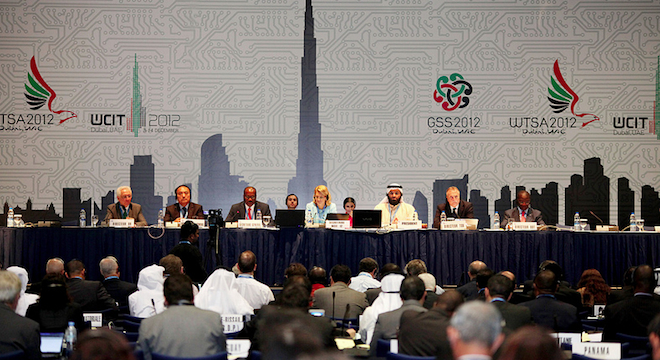A contentious and controversial United Nations telecom summit, the World Conference on International Telecommunications 2012 (WCIT-12), which took place in Dubai over the past two weeks, concluded on Thursday evening with a new series of agreements on the Internet, signed by 89 nations, but which the U.S. and some 54 other countries declined to sign (refused or deferred to consult with their governments, according to DotNxt).
U.S. Ambassador Terry Kramer, one of the leaders of the U.S. delegation, opposed the new agreements, which call upon nations to “ensure the security” of telecommunications and fight “unsolicited bulk electronic communications,” a.k.a. spam. There is also a non-binding resolution that says nations should “foster an enabling environment for the greater growth of the Internet,” but which also states “all governments should have an equal role and responsibility for international Internet governance and for ensuring the stability, security and continuity of the existing Internet and its future development and of the future internet.”
The U.S. and two major allies — the United Kingdom and Canada — opposed the inclusion of the Internet itself as a new area of international governance, fearing such language could be used to impose censorship and restrict or disrupt the current flow of information.
“It’s with a heavy heart and a sense of missed opportunities that the U.S. must communicate that it’s not able to sign the agreement in the current form,” Kramer said, according to the BBC .
The U.S. and allies support the current way the Internet is managed, through a series of non-governmental international associations such as the World Wide Web Consoritum (W3C), which is primarily hosted in the U.S., Japan and France, and the Internet Corporation For Assigned Names and Numbers (ICANN), a Los Angeles based organization that has a U.S. government contract, as the New York Times noted.
Kramer later told Bloomberg that the U.S. delegation members “feel there have been a bunch of proposals which have come in from the outside to hijack the conference.”
However, Kramer also tweeted the U.S. delegation’s willingness to continue discussions: “#WCIT12 isn’t the end of dialogue on role of govts & stakeholders in growth of intl telecom & Internet sectors. Global convo will continue.”
That said, Kramer’s language on “hijacking,” in some ways echoes earlier fears articulated by U.S. lawmakers (namely Congressional Republicans) that some governments — Russia, China, Iran and other Arab States — would propose new regulations giving them the authority to tax highly-trafficked websites or inspect networks for spam, which critics feared could be used as a pretext to monitor user content and communications, and impose censorship.
The new series of agreements are updates to a 1988 treaty called the International Telecommunciations Regulations, or ITRs, which the U.S. and many of the other abstaining parties previously supported. The U.S. and the nations that originally signed that treaty but objected to the new one are still bound by the previous version, which pertains mainly to international telephone calls and cable television, and not the Internet.
The International Telecommunications Union (ITU), the U.N. telecom agency in charge of coordinating the conference, expressed dismay with the U.S. and other dissenters.
The ITU Secretary General, Hamadoun Touré, said he was “very much surprised,” by the outcome, according to the Associated Press, later releasing a statement arguing that the resolution attached to the new agreements was “non-binding” and thus, should not have been cause for concern or dissent. As Touré wrote:
“I repeat that the conference did NOT include provisions on the Internet in the treaty text. Annexed to the treaty is a non-binding Resolution which aims at fostering the development and growth of the internet – a task that ITU has contributed significantly to since the beginning of the Internet era, and a task that is central to the ITU’s mandate to connect the world, a world that today still has two thirds of its population without Internet access.”
But the fact that there were binding portions of the new agreements referring to spam and security call Touré’s claims about there being no Internet mentions into question.
The failure of the conference to reach international consensus on how the Internet should be governed, if at all, is likely to come as a tremendous relief to Western advocacy groups and major tech companies including Google and Mozilla, all of whom vocally opposed the conference.
The ITU blamed the vocal opposition in part for scuttling the conference.
“Perhaps the absence of a misinformation campaign would have helped,” ITU spokesperson Paul Conneally told TPM. “This treaty was never about internet governance, or freedom of expression, yet the campaign against it started before even a single proposal was submitted.”






